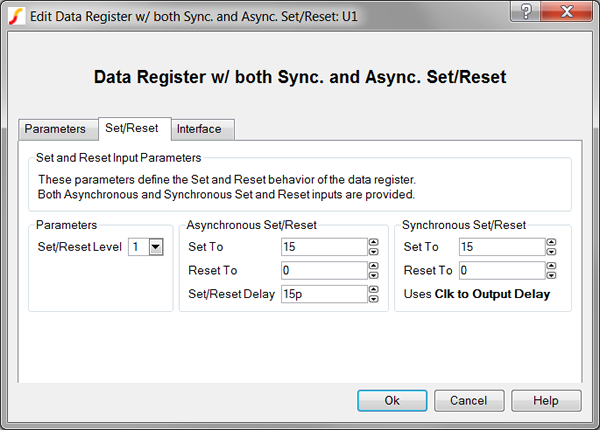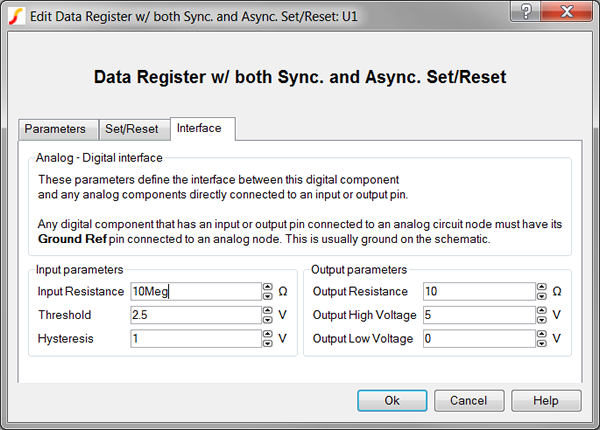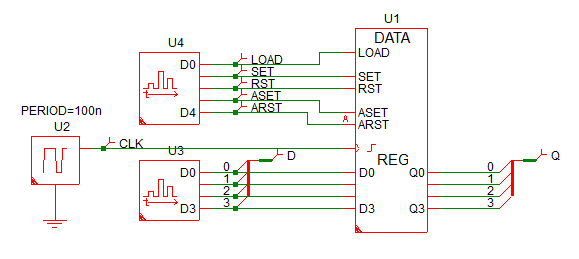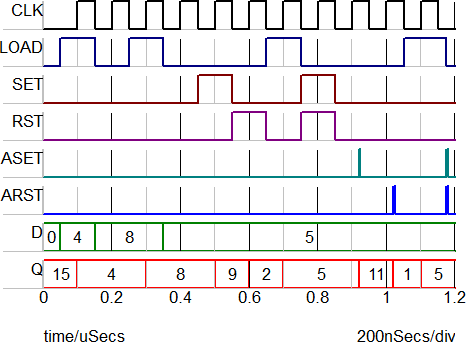SIMPLIS Parts
|
The Data Register with both Async and Sync Set/Reset models a clocked data register with a load (enable) input. The clock edge for the register can be set with the Trigger Condition parameter to be a rising edge (0_TO_1) or a falling edge (1_TO_0). Both asynchronous and synchronous set and reset inputs are provided. The active logic level of the inputs can be configured with the Set/Reset Level and Load Level parameters.
For the data register with either asynchronous or synchronous set and reset inputs, see Data Register.
Related topics:
In this Topic Hide
Model Name: |
Data Register with both Async and Sync Set/Reset |
|
Simulator: |
|
This device is compatible with the SIMPLIS simulator. |
Parts Selector |
Digital Functions | Registers |
|
Symbol Library: |
None - the symbol is automatically generated when placed or edited. |
|
Model File: |
None - the device model is generated before simulation. |
|
Subcircuit Name: |
|
|
Symbol: |
|
|
Multiple Selections: |
Only one device at a time can be edited. |
|
To configure the data register with both async and sync set/reset, follow these steps:

| Label | Parameter Description |
Clock to Output Delay |
|
Number of Bits |
Number of input and output bits for the data register |
Trigger Condition |
Determines the triggering condition of the data register clock pin:
|
Ground Ref |
Determines whether or not a device has a ground reference pin. |
Minimum Clock Width |
Minimum valid clock width. Clock widths less than this parameter will not trigger the data register. |
Setup Time |
|
Hold Time |
|
Initial Condition |
Initial condition of the data register output in decimal |
Load Level |
Determines the logic level of the shift register load (LOAD) pin:
|
To define the set/reset behavior of the data register, follow these steps from the Data Register with both Async and Sync Set/Reset dialog box:

| Label | Parameter Description |
Set/Reset Level |
|
Asynchronous Set/Reset Parameters |
|
Set To |
Determines the data register output value when the asynchronous set pin goes active |
Reset To |
Determines the data register output value when the asynchronous reset pin goes active |
Set/Reset Delay |
Delay from when the set or reset pin goes active until the output is actually set or reset |
Synchronous Set/Reset Parameters |
|
Set To |
Determines the data register output value when the synchronous set pin goes active |
Reset To |
Determines the data register output value when the synchronous reset pin goes active |
To define the parameters for the interface between this digital component and each analog component connected directly to an input or output pin, follow these steps from the Data Register with both Async and Sync Set/Reset dialog box:

| Label | Parameter Description | |||||||
Input Resistance |
Input resistance of each input pin |
|||||||
Threshold Hysteresis |
|
The Threshold (T) and Hysteresis (H) of the Schmitt trigger input buffer on each Register input. To determine the low-to-high threshold (TH) and the high-to-low threshold (TL), substitute Threshold (T) and Hysteresis (H) in each of the following formulas :
|
||||||
Output Resistance |
||||||||
Output High Voltage |
||||||||
Output Low Voltage |
||||||||
The following truth table assumes these parameter values:
Inputs |
Output |
Action |
|||||
LOAD |
SET |
RST |
ASET |
ARST |
CLK |
Q |
|
0 |
0 |
0 |
0 |
0 |
 |
Last Q |
Retain state |
1 |
0 |
0 |
0 |
0 |
 |
Data input |
Load data |
1 |
0 |
0 |
0 |
 |
Synchronous Set To value |
Synchronous set |
|
0 |
1 |
0 |
0 |
 |
Synchronous Reset To value |
Synchronous reset |
|
1 |
0 |
Asynchronous Set To value |
Asynchronous set |
||||
0 |
1 |
Asynchronous Reset To value |
Asynchronous reset |
||||
1 |
1 |
0 |
0 |
 |
Last Q |
Illegal concurrent SET and RST |
|
1 |
1 |
Last Q |
Illegal concurrent ASET and ARST |
||||
The test circuit used to generate the waveform examples in the next section can be downloaded here: simplis_044_dataregister_example.zip.
To simulate this design, follow these steps:

This example of the data register with both async and sync set/reset uses two Digital Signal Sources to generate the input pulses to the data register with both async and sync set/reset. The input source waveforms are defined in a text file with each state transition defined on a single line. These two sources excite every state transition in the truth table.
In the circuit example, the initial condition of the data register with both async and sync set/reset is set to 15 decimal. The behavior of the register in response to the inputs on a rising clock edge is described in the following table.
| Time | Event | Q Output |
100n |
Load | 4 |
200n |
Retain state | 4 |
300n |
Load | 8 |
400n |
Retain state | 8 |
500n |
Set | 9 |
600n |
Reset | 2 |
700n |
Load | 5 |
800n |
Illegal concurrent SET and RST | 5 |
1100n |
Load | 5 |
The asynchronous set and reset inputs are asserted according to this table:
| Time | Event | Q Output |
920n |
Asynchronous set | 11 |
1020n |
Asynchronous reset |
1 |
1175n |
Illegal concurrent ASET and ARST | 5 |
The waveforms for the data register with both async and sync set/reset show each state change.

Because the data register with both async and sync set/reset model is generated by a template script when the simulation is executed, a fixed model cannot be inserted into a netlist. The template script for this device is simplis_make_register_model.sxscr, which you, as a licensed user, can download in a zip archive of all built-in scripts.
To download this zip file, follow these steps:
Note: You will be prompted to log in with the user name and password given to you when you registered.